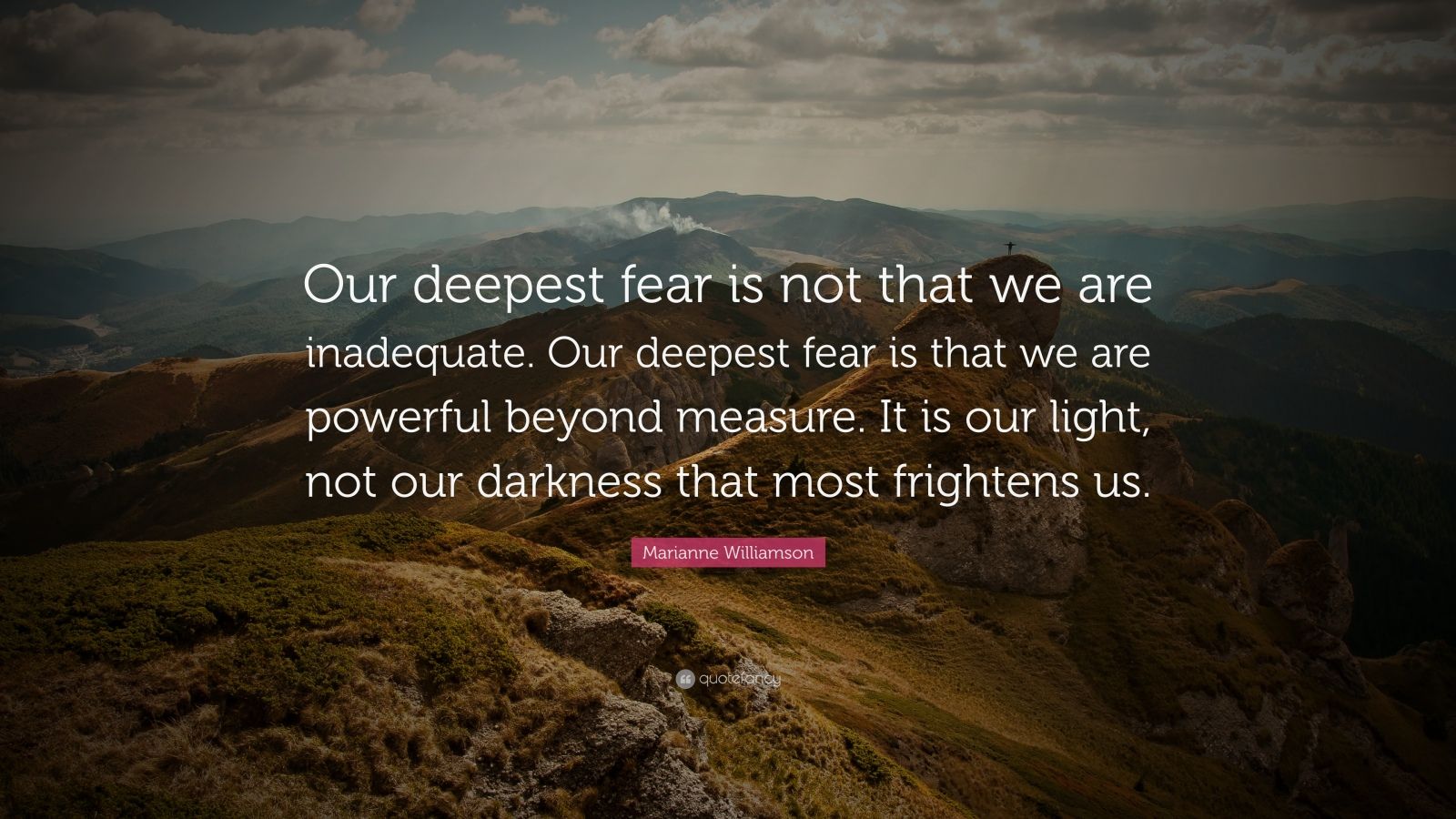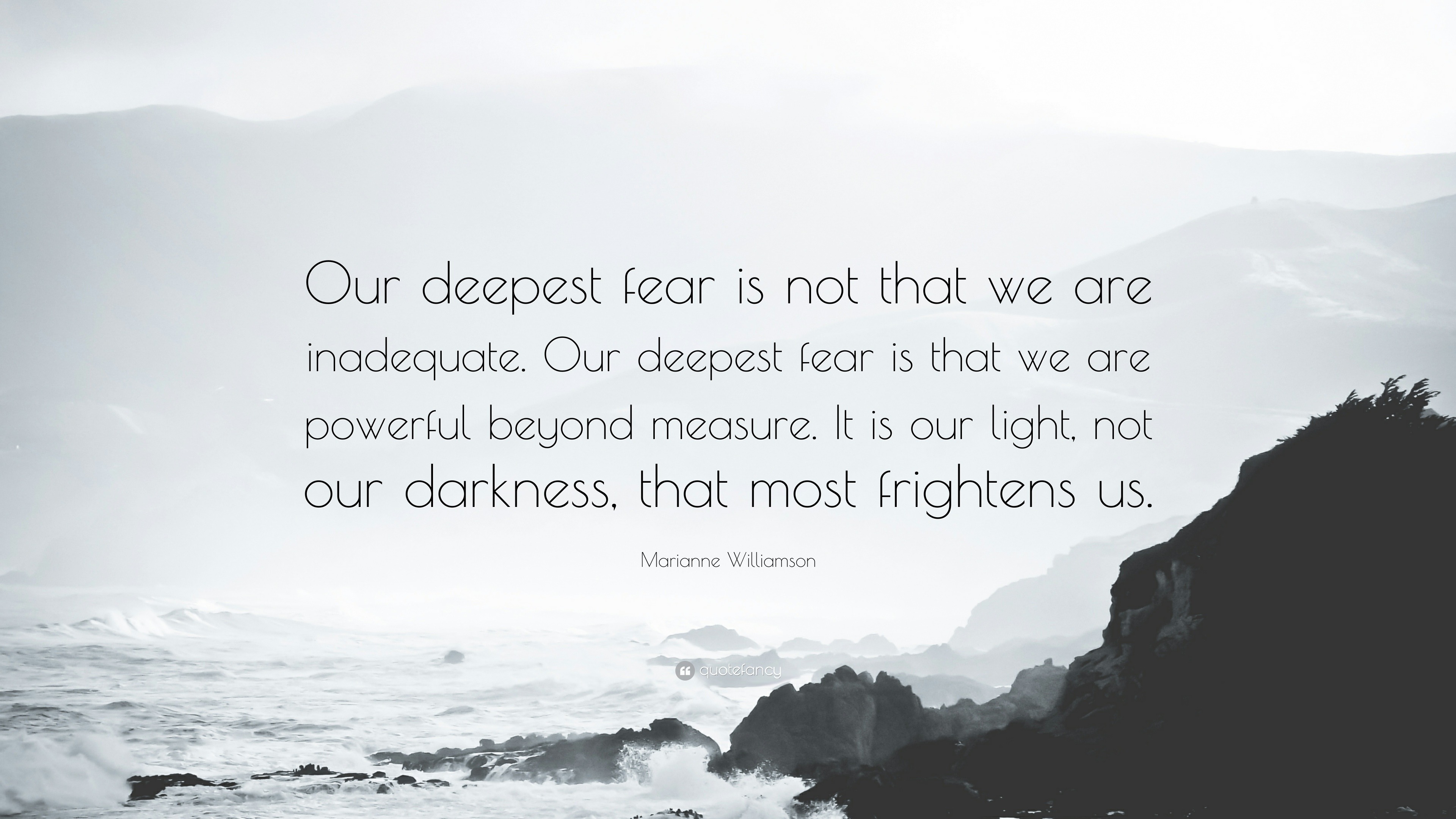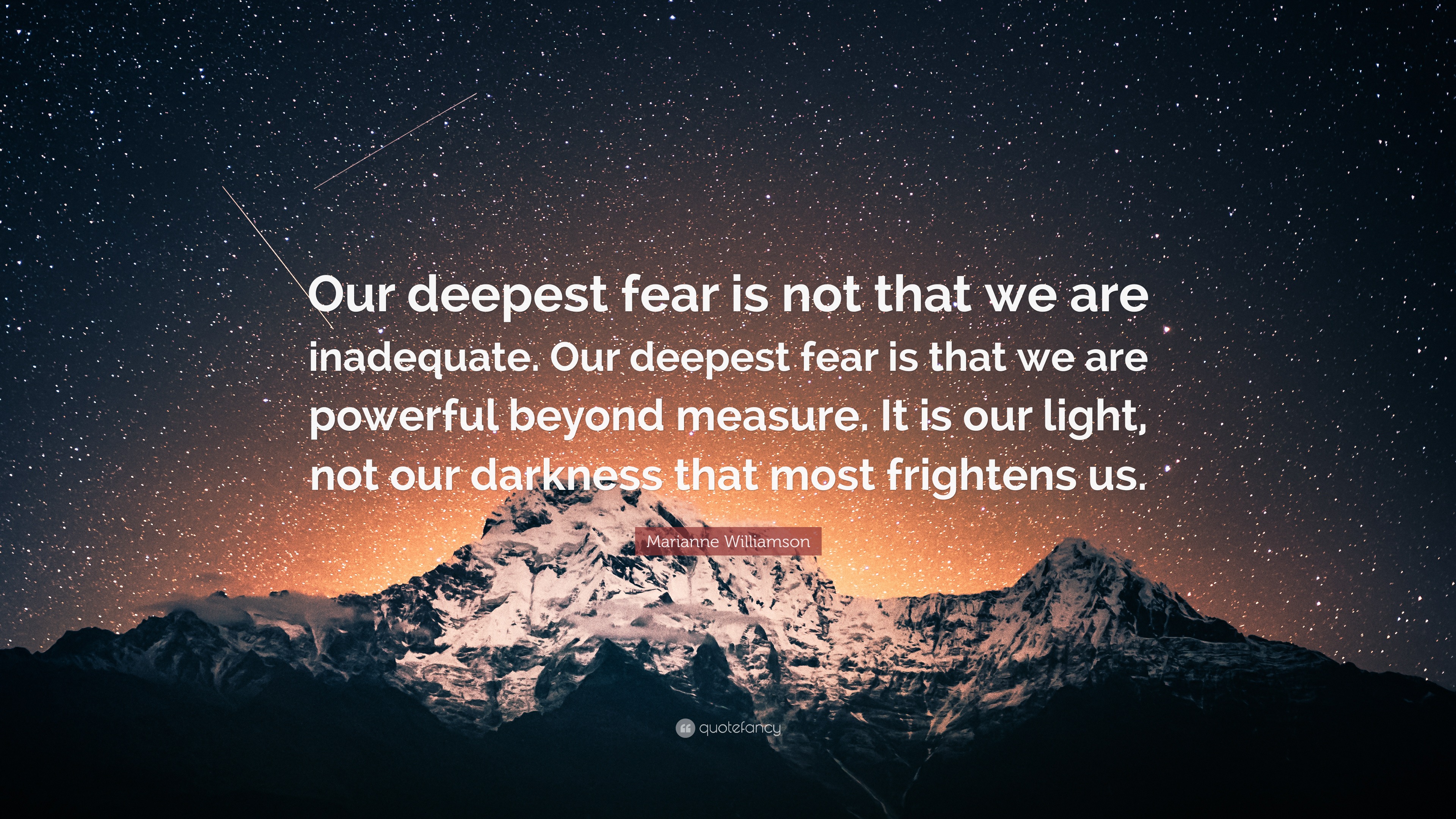Marianne Williamson's "Our Deepest Fear": Quotes & Insights
Do you ever wonder what truly holds us back? Its not our perceived shortcomings, but the immense, untapped potential that lies dormant within us, waiting to be unleashed.
The world is often quick to tell us what we lack, to highlight our flaws and inadequacies. We internalize these messages, creating self-imposed limitations that stifle our growth and prevent us from reaching our full potential. But what if the very thing we fear most isn't failure, but the sheer magnitude of our capabilities? What if the real challenge lies not in overcoming our weaknesses, but in embracing our inherent power?
This is the core message of a passage that has resonated with millions, a passage that has become a touchstone for anyone seeking to understand the depths of human potential. Ironically, this passage, often misattributed to Nelson Mandela, is actually the work of Marianne Williamson. It originates from her 1992 book, "A Return to Love: Reflections on the Principles of a Course in Miracles," and it continues to inspire, challenge, and provoke thought.
| Category | Details |
|---|---|
| Full Name | Marianne Deborah Williamson |
| Born | July 8, 1952 (age 71) |
| Place of Birth | Houston, Texas, U.S. |
| Nationality | American |
| Occupation | Author, Spiritual Teacher, Political Activist |
| Known For | Her work on spiritual and personal transformation, and her presidential campaigns. |
| Books | "A Return to Love," "Illuminata," "A Year of Miracles," and others. |
| Political Affiliation | Democratic Party |
| Website Link | marianne.com |
The passage, which has become a quote, speaks to the profound truth that within each of us lies a reservoir of strength, brilliance, and the capacity for greatness. It reads, "Our deepest fear is not that we are inadequate. Our deepest fear is that we are powerful beyond measure. It is our light, not our darkness, that most frightens us. We ask ourselves, 'Who am I to be brilliant, gorgeous, talented, fabulous?' Actually, who are you not to be? You are a child of God. Your playing small does not serve the world."
This is not just a collection of words; it's a call to action. It's a challenge to confront the self-doubt that holds us captive and to embrace the potential that lies dormant within. It's a reminder that our hesitation to shine, to fully express ourselves, has far-reaching consequences. Our playing small, as Williamson eloquently puts it, does not serve the world. The world needs our unique talents, our perspectives, and our contributions.
The misattribution of this quote to Nelson Mandela, though inaccurate, speaks to the universality of its message. Mandela, a symbol of resilience, courage, and unwavering belief in the human spirit, embodies the very principles that Williamson articulates. The misattribution, in a sense, highlights the profound impact of the quote, as it aligns with the ideals of empowerment and self-realization.
- Lela Sohna Leaks Uncensored Videos Exclusive Content
- Mmsbee47com Competitors March 2025 Top 5 Sites Alternatives
The core message of the passage revolves around the idea that we often shy away from our own greatness. We become so accustomed to focusing on what we lack, the perceived shortcomings, that we fail to recognize the incredible potential that resides within. We are afraid to be brilliant, to be talented, to be fabulous, because it requires stepping outside our comfort zones and challenging the limiting beliefs weve constructed over time.
The core ideas within the passage, as articulated by Williamson, are rooted in the principles of personal transformation and spiritual growth. The text draws on concepts of self-love, forgiveness, and the understanding that we are all interconnected. The implication is that embracing our inner power not only benefits ourselves, but also contributes to the well-being of the world around us.
The book, "A Return to Love", from which the famous quote is taken, delves deeper into the principles of "A Course in Miracles," a spiritual self-study program. It emphasizes the power of love, the importance of forgiveness, and the recognition of our divine nature. Within this context, the quote encourages us to embrace our divine potential, to recognize our capacity for greatness, and to release the fear that holds us back.
Williamson's work offers a framework for self-discovery and personal transformation. She provides practical guidance for navigating the complexities of life, emphasizing the importance of self-awareness, forgiveness, and compassion. Her writing is characterized by its inspirational tone, its focus on spiritual principles, and its ability to connect with readers on a deeply emotional level.
The question "Who am I to be brilliant, gorgeous, talented, fabulous?" is a particularly powerful one. It challenges us to examine the limiting beliefs that hold us back. It questions our self-doubt and encourages us to embrace our inherent potential. It reminds us that we are all children of the divine and that we are worthy of the greatness that resides within.
The passage suggests that our light, our brilliance, is what truly frightens us. It is the prospect of stepping into our full potential, of embracing our unique gifts, that can be both exhilarating and daunting. We fear being seen, being judged, or failing to live up to our own expectations. But the quote urges us to move beyond these fears and to recognize that our light, our ability to shine, is what the world needs.
The call to action at the end of the passage, "Your playing small does not serve the world," is a crucial one. It reminds us that our choices have consequences, that our self-doubt can negatively impact others. When we hold back, when we fail to express our full selves, we rob the world of our unique contributions. We create a ripple effect of missed opportunities and unfulfilled potential.
It's crucial to understand the context of the quote. Williamson is a spiritual teacher and author focused on personal transformation. Her work provides a framework for self-discovery, drawing on concepts of love, forgiveness, and the understanding that we are all interconnected. Her books and teachings provide a perspective on the idea that the capacity for greatness and personal transformation is within everyone.
There is an important connection between the misattribution and the broader themes of the quote. The misattribution to Nelson Mandela demonstrates how profoundly this message resonates with the ideals of human potential, resilience, and the importance of finding your own inner strength.
This passage, and especially Williamsons closing words, As we are liberated from our own fear, our presence automatically liberates others, are often incorrectly credited to Mandela, which speaks to the power and universality of the message.
The misattribution underscores the significance of the words. Nelson Mandela spent decades fighting for freedom, and his message of perseverance and hope aligns with Williamsons principles of personal empowerment. The fact that people frequently associate the quote with Mandela speaks volumes about how powerful it is and how its message of overcoming fear resonates with a broad audience.
The quote, as it turns out, offers a pathway for personal growth. Here are some reflection questions based on the core ideas articulated within the passage:
- What limiting beliefs hold you back from recognizing your own power?
- How does the fear of being brilliant manifest in your life?
- What specific talents or gifts are you hesitant to share with the world?
- How can you challenge your self-doubt and embrace your potential?
- In what ways does your "playing small" negatively impact others?
- How can you cultivate self-love and compassion to support your growth?
- What steps can you take to step outside your comfort zone and express your true self?
- How can you use your unique talents to make a positive difference in the world?
- What does it mean to you to be a child of the divine?
- How can you consciously liberate yourself from fear and embrace your inner power?
Williamsons work has transcended the boundaries of traditional religion and spiritual teachings. Her message of self-discovery and personal transformation continues to inspire. The core message is simple: The capacity for greatness and for making a positive impact in the world lies within each of us. It is our responsibility to discover and embrace this power.
Another insightful poem to consider alongside Williamson's message is "The Invitation" by Oriah Mountain Dreamer. This poem, like Williamson's passage, encourages readers to confront their fears and to embrace their true selves. Both works provide valuable tools for self-reflection and personal growth.
As a speaker and writer on transformational wisdom for over four decades, Marianne Williamson has delved into the metaphysics of great religious and spiritual figures, and has offered to the world a profound insight into the human condition. Her works have become a source of inspiration and guidance for countless individuals seeking to live more authentic, fulfilling lives.
In the realm of self-help and spiritual guidance, it is common to encounter an avoidance of serious discussions about core religious topics. However, Williamson's approach consistently tackles deeper questions, and her work provides a perspective to her audiences and to the world.
The power of this quote lies in its simplicity and its profound truth. It resonates with those who are struggling with self-doubt, who feel trapped by their fears, or who long to live a more authentic life. It offers a powerful message of hope, empowerment, and the potential for transformation. It calls on us to release our limiting beliefs and embrace the greatness that resides within.
It is crucial to examine the source to understand the deeper context. The core message, which originated in A Return to Love by Marianne Williamson, is not just a standalone quote, but a statement that encourages the world to self reflect. The quote also reminds us that we have the potential to be transformative agents in our own lives and the lives of those around us.
Most of you have heard Marianne Williamsons famous deepest fear quote. You dont have to agree with her politics, enjoy her books, or like her. Her words deserve to be carefully read and understood because they offer an opportunity to grow both personally and spiritually.
The poem's influence on culture goes beyond simply being a quote; it's a challenge to rethink our self-perceptions and a call for individual empowerment. It serves as a reminder that our inner potential is far greater than we might ever suspect, and that by embracing our true selves, we contribute to a brighter, more vibrant world.
In considering the journey to discover and activate this potential, it helps to ask questions to go deeper with the teachings. Reflect on what resonates within you when considering the idea that our deepest fear is not inadequacy but the untapped power within. As a result, you can begin to realize that the true limitations we face exist primarily in our own minds.
Williamson's message encourages us to shed self-doubt, embrace our unique talents, and to live in a way that contributes to the greater good. It's a call to action, a reminder that we have the power to create positive change in the world.



Detail Author:
- Name : Gage Prosacco IV
- Username : shea.wyman
- Email : lupe57@gmail.com
- Birthdate : 1986-03-17
- Address : 3114 Anissa Skyway Suite 841 Walterhaven, DC 04809-9876
- Phone : +1-539-299-9183
- Company : Dach-Conroy
- Job : Reporters OR Correspondent
- Bio : Aliquid culpa nesciunt nesciunt quia sit reiciendis. Officia qui est non. Corporis facilis error velit odit ut quaerat.
Socials
linkedin:
- url : https://linkedin.com/in/yesenia3989
- username : yesenia3989
- bio : Animi dolorum ex molestias.
- followers : 589
- following : 2236
instagram:
- url : https://instagram.com/jones1972
- username : jones1972
- bio : Voluptates vitae aperiam occaecati atque. Corporis eligendi qui qui. Illum vero distinctio nulla.
- followers : 366
- following : 254
twitter:
- url : https://twitter.com/yesenia_xx
- username : yesenia_xx
- bio : Deserunt dolorem molestiae veniam esse beatae. Consequatur voluptas qui voluptate minus repudiandae fugit.
- followers : 5054
- following : 144
facebook:
- url : https://facebook.com/yeseniajones
- username : yeseniajones
- bio : Tenetur hic molestiae et.
- followers : 1454
- following : 1890